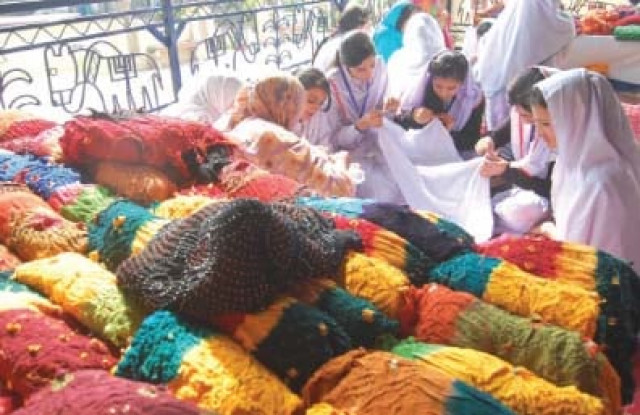Craft of the month: Youth learn art of chunri, kite-making
Master artisans impart the training

Over 100 students participated to learn chunri and kite-making in the programme aimed at creating link between culture and education. PHOTO: MUHAMMAD JAVAID/EXPRESS
Over 100 students participated in the programme.
The performances began with a Basant themed folk song performed by Sajal and Sanobar from Iqra University who sang “bo kata” beautifully followed by younger students from different branches of Islamabad model colleges and schools. The event featured folk songs of all provinces.
MNA Dr Ramesh Kumar, chief guest of the event, said that there was a dire need to lessen hatred not just between different religions but also between cultures and provincial languages and traditions.
He further said that the beauty of the event was that regardless of what province the students represented, they all looked like they represented Pakistan.
“Basant has been criminalised and our aim is to ensure that it is celebrated peacefully and beautifully,” Lok Virsa Executive Director Fouzia Saeed told The Express Tribune.
She further said that it was important for them to realise the difference between unity and similarity. “The idea is to celebrate the diversity to bring people closer through appreciation and integration,” she added.
Islamabad Model College for Girls G-9/2 Principal Parveen Akhtar Malik thanked the Federal Directorate of Education and Lok Virsa for hosting the series, which helps children in learning about their culture, traditions and new skills.
Chunri is one of the traditional dying crafts of Pakistan. The technique, which began about 5,000 years ago, involves tying the fabric with thread to create designs and motifs after which it is dyed. Most popular material to use is cotton.
The art of kite making is believed to have originated from China which eventually found its roots in South Asia.
Master artisans Ameer Mai, Shamim Mai, Razia Bibi and Muhammad Farhan will impart training in chunri-making while kite-makers include Muhammad Qaiser, Muhammad Nasir and Abdul Basit.
Published in The Express Tribune, March 2nd, 2016.



















COMMENTS
Comments are moderated and generally will be posted if they are on-topic and not abusive.
For more information, please see our Comments FAQ